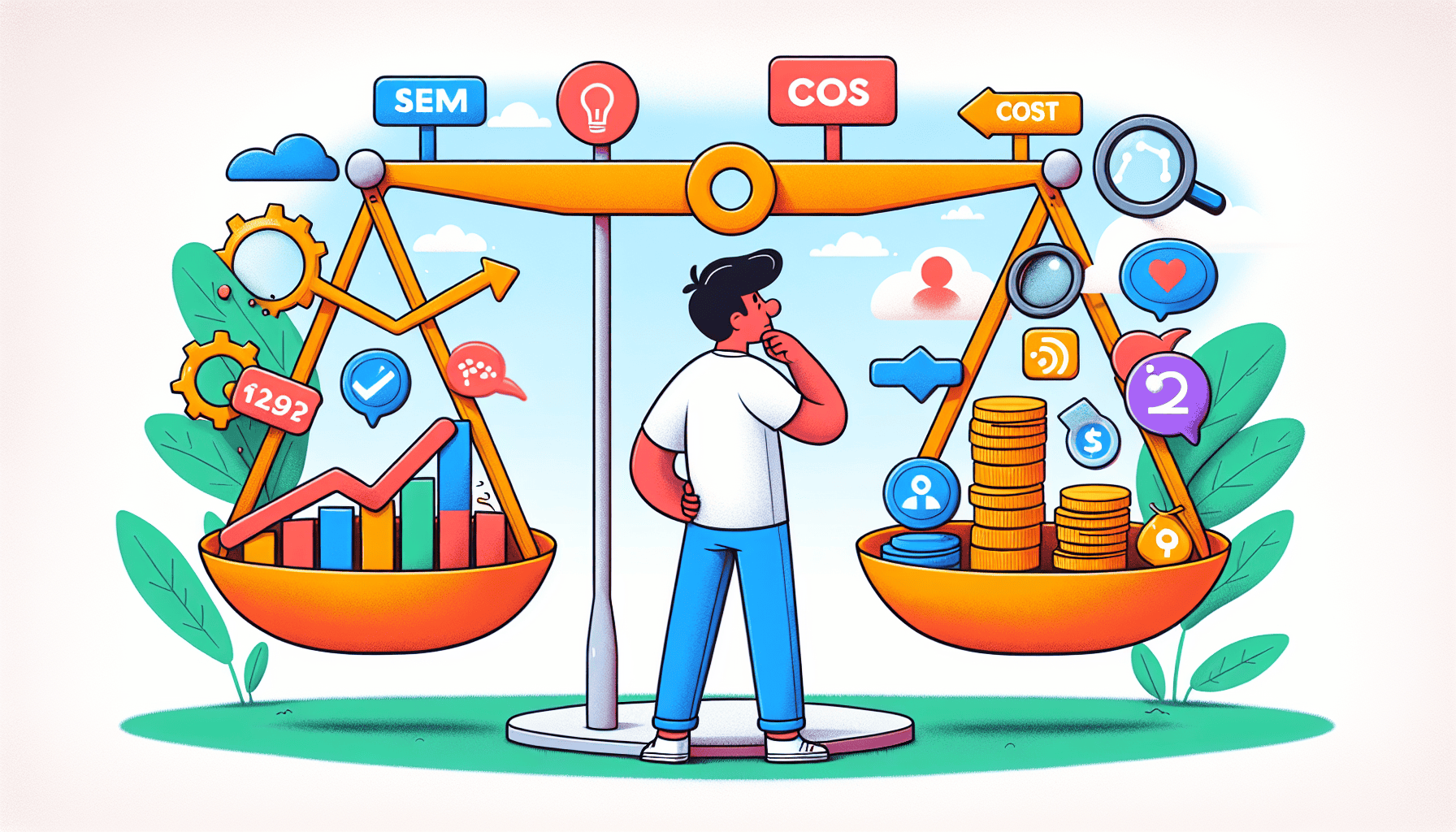Looking for the best search engine marketing tool to boost your SEM strategy? This article highlights the top 10 tools that can help you improve ad performance, manage campaigns, and stay ahead of the competition in 2024.
Key Takeaways
- The article highlights essential SEM tools such as Google Ads, SEMrush, and Ahrefs, crucial for optimizing search engine marketing strategies in 2024.
- Effective keyword research and automation are pivotal for successful SEM campaigns, with tools like Google Ads Keyword Planner and Optmyzr streamlining processes.
- Future trends in SEM will emphasize the integration of AI technologies and personalization, necessitating adaptation in marketing strategies to enhance user engagement.
Essential Search Engine Marketing Tools for 2024

In the ever-evolving arena of search engine marketing, having access to the appropriate instruments is critical. These tools play a significant role in tracking advertisement success, performing keyword research, and overseeing campaign outcomes. As we edge closer to 2024, leveraging these tools becomes increasingly vital for gaining a competitive advantage.
Anticipated to be frontrunners in 2024 are Google Ads and SEMrush as leading search engine marketing tools. Their significance lies in their capacity to improve your strategy within this domain substantially. Let’s delve into how each tool can bolster your marketing initiatives effectively.
Google Ads
Google is the most popular search engine. Ads serve as a fundamental component in a solid Search Engine Marketing (SEM) approach, offering the ability for marketers to craft ads that target audiences on platforms like Google, YouTube, and affiliated websites. Its flexibility makes it an invaluable asset for connecting with particular demographic groups.
At the heart of its effectiveness is the Google Ads Keyword Planner, an essential keyword research tool that aids in pinpointing valuable keywords crucial for success. It also assists in approximating bidding prices and strategizing ad campaigns meticulously. By leveraging Google Ads, companies can secure prominent placement at the apex of search engine results pages, thereby enhancing their traffic flow and conversion rates.
SEMrush
SEMrush stands as a multifaceted competitive intelligence suite pivotal for businesses aiming to outperform rivals in the digital arena. It encompasses an array of capabilities crucial to online marketing disciplines such as SEO, PPC, content marketing, and social media marketing. The tool’s core advantage lies in its ability to furnish comprehensive insights into competitors’ tactics.
In terms of functionality, SEMrush excels at providing services like keyword research, competitor analysis, backlink monitoring, and on-page optimization techniques. By delivering an integrated perspective on your entire digital marketing strategy, it enables you to make well-informed choices that are key to climbing search engine rankings and enhancing your web presence significantly.
Ahrefs
Ahrefs stands out for its sophisticated SEO instruments, notably in keyword research and scrutinizing backlinks. Marketers find this tool essential when their goal is to boost organic traffic and ascend search engine rankings.
Notable functionalities within Ahrefs include the Keywords Explorer, offering extensive analysis on how keywords fare, as well as the Content Explorer that aids in discovering ideas for content and chances for linking. Utilizing Ahrefs can empower companies to polish their approaches to content and heighten their profile across search engines.
SpyFu
Using SpyFu, companies can gain an edge by delving into the keywords and ad variations their rivals are investing in, thereby improving their marketing campaigns. By offering insights into competitors’ keyword purchases and advertising tests, it serves as a potent instrument for enhancing one’s own marketing strategies.
Businesses can craft more robust and impactful marketing efforts by monitoring the approaches of their adversaries through SpyFu. The tool also presents an affordable pricing model that renders it a practical choice for numerous marketers seeking to optimize competitor research without breaking the bank.
Optmyzr
Optmyzr serves as an effective automation tool for managing PPC campaigns on Google and Bing, streamlining repetitive tasks. This enhancement in ad management efficiency enables marketers to dedicate more time to strategic planning and optimization activities.
WordStream
WordStream serves as a powerful instrument designed to enhance Google Ads campaigns through its suite of features, which includes management capabilities for advertisements, sophisticated reporting options, tools geared towards optimization, notifications, and instruments that streamline workflow. This platform excels at boosting the caliber of advertisement copywriting while also elevating the general efficiency of campaigns.
The system persistently expands its collection of keywords while meticulously scrutinizing aspects such as the application of negative keywords, the quality of landing pages, and the excellence in ad text composition with an aim to refine Google Ads efforts. The dedication to ongoing optimization ensures that your ads maintain their potency and pertinence.
Microsoft Advertising
Microsoft Advertising presents a pay-per-click (PPC) advertising platform designed for businesses to generate economical advertisements on Bing, Yahoo!, and AOL, tapping into distinct audience segments. It serves as an advantageous substitute for Google Ads, providing marketers with the opportunity to engage with an alternative subset of prospective consumers.
AdEspresso
AdEspresso serves as an efficient multifunctional tool designed to manage and enhance the effectiveness of advertising campaigns across different platforms. It is a valuable asset for marketers aiming to consolidate their ad management process on various channels.
With its expertise in multi-platform ad handling, AdEspresso assists marketers in elevating their ad performance while optimizing their expenditure on ads. The platform’s intuitive interface coupled with robust functionalities positions it as a top pick amongst digital marketing professionals.
Skai (Formerly Kenshoo)
Focusing on the optimization of advertising effectiveness across multiple platforms, Skai caters to enterprise-level companies with sophisticated features specifically crafted for expansive marketing campaigns. This tool is a vital element for enterprise solutions given its ability to fine-tune large-scale promotional activities.
AdRoll
AdRoll offers a robust marketing platform featuring capabilities like retargeting, prospecting, and email marketing. These features enable companies to precisely target certain demographics and efficiently re-engage with prospective clients.
The functionalities provided by AdRoll are instrumental in bolstering advertisers’ return on investment while simultaneously amplifying customer interaction. The tool is exceptionally useful for enterprises seeking to consolidate various marketing activities within a singular system.
What is Search Engine Marketing?

SEM, or search engine marketing, leverages paid advertisements to ensure that a company’s offerings are more visible on search engine results pages (SERPs). This practice integrates both organic strategies like SEO and paid efforts within the broader framework of digital marketing. It is an essential method for generating leads and strengthening online presence via various search engine-focused approaches.
The core objective of SEM is to advertise products and foster business growth through internet channels. In contrast to traditional SEO techniques dedicated exclusively to unpaid ranking enhancement, SEM employs a synergistic blend of organic optimization tactics alongside strategic paid advertising initiatives—collectively enhancing the efficiency of overall digital promotional activities.
How Does Search Engine Marketing Work?

SEM largely entails acquiring advertising space with specific keywords in mind, enhancing the presence of a company’s advertisement on search engine results pages. Within SEM initiatives, these advertisements are positioned prominently at the top of search results, surpassing the organic listings achieved through SEO.
Each time someone conducts a search query, an ad auction is triggered to decide which ads appear and their sequence based on both bid levels and quality scores. The Quality Score assesses your advertisement’s overall merit and significantly affects its eventual position. Continuous analysis of keywords is essential in successful SEM strategies so that advertisements correspond with what prospective customers are actually seeking.
In Pay-Per-Click (PPC) marketing efforts, companies have control over their expenditure by stipulating the maximum they’re willing to pay for each click. This figure then contributes to determining outcomes within the ad auction framework. An SEM campaign’s performance hinges on its ads’ click-through rates — indicative measures of user interaction — affirming that not only does bidding highest impact rank but also how pertinent both advert content and connected landing page are considered during auction evaluations.
Benefits and Drawbacks of Using SEM Tools

SEM tools offer companies the capability to precisely target audiences using keyword and demographic-based filters. The pay-per-click model provides a cost-effective strategy, charging advertisers solely for actual ad clicks. In contrast to SEO’s gradual impact, SEM delivers swift results.
Nevertheless, mastering SEM tools demands time and may present a steep learning curve for their effective use. Continuous investment is necessary since ongoing expenditures are essential to keep an SEM campaign active and visible. Intense competition for desirable keywords can escalate expenses which could adversely affect profitability.
It’s crucial for businesses to consider both the advantages of heightened visibility and task automation that SEM offers against its associated costs and operational challenges. PPC campaign management is facilitated by tools such as Optmyzr through the automation of repetitive tasks, thereby improving operational efficiency.
Best Practices for Utilizing SEM Tools
Utilizing SEM tools along with an SEO tool is essential for optimizing campaign effectiveness and meeting marketing objectives. Marketers can harness the power of platforms like Google Analytics to gain instant insights into how well their SEM campaigns are performing.
Through these analytical platforms, marketers have the ability to make immediate modifications to their campaigns, enabling quick strategy refinements according to performance data. We should consider exploring best practices that enhance the effective use of these SEM tools.
Conduct Thorough Keyword Research
In the realm of search engine marketing, it’s vital to stay ahead of competitors by finding profitable keywords through competitive research. By leveraging Google Trends, marketers can pinpoint which search terms are gaining popularity and steer clear of those that are losing traction. The main goal in conducting keyword research for SEM initiatives is to discover relevant keywords tailored for ad campaigns.
Essential tools like traditional keyword research instruments provide critical data necessary for crafting focused search engine marketing efforts. The Google Ads Keyword Planner assists by supplying bid estimates along with insights into various keywords crucial to devising advertising strategies. WordStream’s Free Keyword Tool has the capability to propose specific keyword recommendations catered towards SEM needs.
For funneling precise traffic towards landing pages within a PPC strategy framework, deploying certain kinds of keywords—like long-tail ones—is indispensable. Deciding on appropriate keywords on which bids will be placed marks an essential juncture in any competent PPC approach. Maintaining a well-structured account featuring neatly organized groupings of keywords is paramount for achieving triumph in search engine marketing campaigns.
Integrate SEM Tools with Other Marketing Platforms
Utilizing SEM tools in tandem with additional marketing platforms can amplify data usage and unify marketing initiatives. AdRoll consolidates multiple marketing tasks such as retargeting and email campaigns within a single platform, thereby streamlining the process.
Incorporating SEM tools alongside various other marketing platforms enables companies to devise a unified digital marketing strategy that harnesses data from diverse channels. Through this integration, it coordinates and bolsters overall marketing efforts.
Leverage Automation Features
SEM automation streamlines functions such as managing bids, thereby improving operational efficiency. Platforms like Optmyzr offer automated management of PPC campaigns, freeing up marketers to concentrate on strategic planning instead of monotonous activities.
The intuitive design of these platforms delivers insights that can be put into action, simplifying the optimization process for marketers’ campaigns. By embracing automation capabilities, one can substantially enhance the performance and influence of SEM initiatives, guaranteeing that they are not only efficient but also effective.
Pricing Expectations for SEM Tools
Most SEM tools offer a range of monthly subscription tiers, enabling users to choose an option that aligns with their financial constraints and needs. For major corporations engaging in extensive marketing campaigns, tailored pricing is usually available depending on the size and scope of their operations.
These tools often include sophisticated features such as competitor analysis and detailed reporting, which may warrant steeper costs. When planning expenses for SEM tools, it’s important to account not only for the software but also for the expense of employing experts or independent contractors proficient in using these technologies.
Future Trends in Search Engine Marketing

Developments in artificial intelligence, such as Google’s Smart Growth Engine (SGE), are poised to revolutionize search experiences by making them more tailored and interactive. The integration of AI and automation is anticipated to significantly improve the processes involved in optimizing and managing SEM campaigns.
As AI-driven tools become more prevalent, there will be a shift away from conventional keyword-focused approaches towards personalization that draws on an analysis of user behavior. With the growth of voice search capabilities, it will become imperative for SEM strategies to evolve alongside natural language processing technologies so they can align with conversational usage patterns.
To achieve success in engine marketing amidst this evolving digital terrain, marketers must embrace advanced technological solutions and craft data-informed strategies for crafting personalized user experiences. It’s critical for these professionals to develop integrated omnichannel plans that reflect how search engine marketing converges with various other marketing channels.
Summary
In summary, search engine marketing stands as a critical component within the realm of digital marketing strategy. It grants companies the resources needed to increase their online presence and attract visitors. Various platforms, including Google Ads, SEMrush, and AdRoll, provide an array of features that support different facets of search engine marketing such as conducting keyword research and overseeing campaigns.
Businesses can gain a competitive advantage by mastering these tools to refine their marketing endeavors, elevating ad performance along the way. As we advance forward, it will be essential for businesses to remain informed about emerging trends like artificial intelligence (AI) and voice search in order to preserve their lead in the constantly evolving digital marketplace.
Frequently Asked Questions
What is Search Engine Marketing (SEM)?
Search Engine Marketing (SEM) is a strategy that utilizes paid advertisements to increase visibility on search engine result pages. It plays a crucial role in lead generation and enhancing one’s online presence.
How does Google Ads help in SEM?
By leveraging Google Ads, SEM effectiveness is amplified as it allows for the crafting of targeted ad campaigns that span multiple platforms like Google and YouTube. The inclusion of tools such as the Keyword Planner helps pinpoint valuable keywords, thereby refining advertising approaches for better results.
What are the benefits of using SEM tools?
Employing SEM tools in digital marketing offers the significant benefit of promptly connecting with specific audiences, as they operate on a pay-per-click basis which means expenses are only accrued when there is real interaction.
Although these tools can be complex to handle, their strategic value in navigating the digital market space is considerable.
Why is keyword research important in SEM?
Engaging in keyword research is fundamental for search engine marketing (SEM), as it assists in discovering lucrative keywords to focus on within campaigns, optimizing the use of advertising budget and minimizing resources allocated to waning keywords.
Employing tools like Google Ads Keyword Planner and Google Trends can significantly improve this endeavor, facilitating well-informed planning for triumphant ad campaigns.
What future trends should marketers watch for in SEM?
Marketers should closely monitor advancements in AI for personalized search experiences, the integration of AI-powered tools for campaign optimization, and the increasing importance of voice search.
Developing cohesive omnichannel strategies will be essential for maintaining competitiveness in the evolving landscape of SEM.
